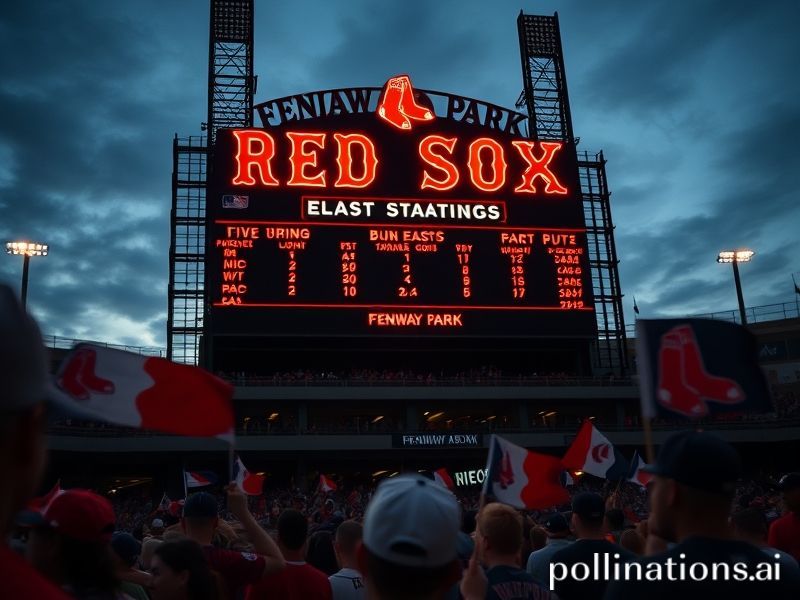Red Sox Standings as Global Omen: How a .500 Ballclub Explains Brexit, Bitcoin, and the End of Hope
**From Fenway to the Fall of Empires: How the Red Sox Standings Mirror a World in Decline**
While the world watches grainy TikToks of Ukrainian drone strikes and central bankers debate whether to crash the housing market slowly or all at once, the Boston Red Sox have spent the spring perfecting the art of hovering three games under .500—a statistical purgatory so dull it makes Switzerland look like Ibiza. To the untrained eye, this is merely another American baseball franchise stuck in mid-table mediocrity. To the international observer, it is a geopolitical weather vane: if the Sox can’t decide whether they’re contenders or rebuilding, what hope is there for the rest of us choosing between democracy and whatever Elon Musk is calling Twitter this week?
Consider the global implications. The Red Sox payroll—roughly the GDP of Fiji—currently buys fewer wins than a Swiss rail strike. That inefficiency is contagious. The same consultants who convinced Boston to pay a utility infielder like a Baltic central-bank governor are now advising the British Treasury, which explains why the pound sterling bounces like a knuckleball on a windy day. When a left-handed reliever who can’t locate the strike zone earns more annually than the entire Rwandan health budget, you understand why Ghana’s finance minister watches ESPN with the sound off and a bottle of something stronger than palm wine.
Across the Atlantic, Europeans pretend to be above such vulgar spending. Yet LIV Golf, the Saudi sovereign-wealth fund’s attempt to buy legitimacy the way a teenager buys friends with stolen vodka, copied MLB’s playbook page for page: overpay for past performance, ignore chemistry, hope nobody notices the body count. The difference is that when the Red Sox collapse, only a few Dunkin’ franchises suffer. When the Saudis get bored, an entire professional sport wakes up in a bathtub of ice missing a kidney.
Asia, meanwhile, views the standings with the detached curiosity of a creditor inspecting a toddler’s lemonade ledger. Japanese fans still wear David Ortiz jerseys in Shibuya, but they now pair them with face masks commemorating Fukushima—an accessory combo that screams “I survived two nuclear disasters, one of them baseball-related.” Chinese state television broadcasts Sox highlights as cautionary programming: watch what happens when you let labor unions negotiate breakfast spreads. The Communist Party prefers victories you can script, like Taiwan’s eventual “voluntary” reunification or the overnight disappearance of a provincial governor who questioned the five-year plan.
Down in Latin America, where the pipeline of teenage shortstops rivals the pipeline of narcotics, families gather around cracked smartphones to check if the kid who left the village on a cattle boat is still hitting above the Mendoza Line. Every strikeout is a remittance delayed; every homer a new roof for grandma. The Red Sox standing sixth in the AL East translates directly to whether cousin José can replace the dialysis machine in San Pedro de Macorís before it gives out. Baseball-reference.com is thus classified by the State Department as essential infrastructure, right next to undersea cables and whatever server still hosts Biden’s Twitter account.
And then there is the existential layer. A Red Sox season that began with “this could be the year” now smells like week-old chowder in August humidity. The same arc—delusional optimism, midsummer betrayal, mathematical elimination—plays out in every G-20 capital. Climate accords, crypto regulation, the TikTok ban: all of them follow the identical trajectory as a Chris Sale slider that never breaks. We sign the treaty, schedule the summit, promise to limit warming to 1.5 °C, and wake up to find ourselves 6.5 games out of the wild card with 38 to play. The universe is not indifferent; it’s just a .500 ballclub in a division with better pitching.
So when some earnest Boston barista insists the Sox are “only a hot streak away,” remember that the same phrase is currently being recycled by Bank of Japan governors, French pension ministers, and whoever is still pretending the Houthis read cease-fire memos. The standings are never only about baseball. They are a polite reminder that entropy bats last, and entropy cheats on the luxury tax.
In short: the Red Sox are going nowhere, slowly. Join the club. It’s international, it’s expanding, and the membership dues are deducted automatically—no opt-out clause, no seventh-inning stretch, no refund when the lights finally go out.







